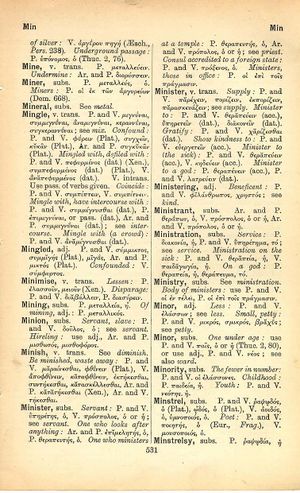minor: Difference between revisions
πενία μόνα τὰς τέχνας ἐγείρει → poverty alone promotes skilled work, necessity is the mother of invention, necessity is the mother of all invention, poverty is the mother of invention, out of necessity comes invention, out of necessity came invention, frugality is the mother of invention
(CSV4) |
(6_10) |
||
| Line 5: | Line 5: | ||
'''subs.''' | '''subs.''' | ||
<b class="b2">One</b> under <b class="b2">age</b>: use P. and V. [[παῖς]], ὁ or ἡ (Thuc. 2, 80), or use adj., P. and V. [[νέος]]; see also [[ward]]. | <b class="b2">One</b> under <b class="b2">age</b>: use P. and V. [[παῖς]], ὁ or ἡ (Thuc. 2, 80), or use adj., P. and V. [[νέος]]; see also [[ward]]. | ||
}} | |||
{{Lewis | |||
|lshtext=<b>mĭnor</b>: ātus, 1, v. dep. (<br /><b>I</b> [[act]]. collat. form, v. [[mino]]) [[minae]], to [[jut]] [[forth]], [[project]].<br /><b>I</b> Lit. ([[only]] [[poet]].): geminique minantur In [[caelum]] scopuli, Verg. A. 1, 162: saxa minantia [[caelo]], Sil. 4, 2.—<br /><b>II</b> Transf., to [[threaten]], [[menace]] one [[with]] [[any]] [[thing]]; constr. alicui, alicui aliquid, [[with]] abl., [[with]] acc. and inf., or [[with]] ne.<br /> <b>A</b> In gen. ([[class]].).<br /> <b>(a)</b> Alicui, Cic. Verr. 2, 4, 66, § 149. —<br /> <b>(b)</b> Alicui aliquid: crucem minari alicui, Cic. Tusc. 1, 43, 102.—<br /> <b>(g)</b> With abl.: coepit minari [[interdum]] ferro, Sall. C. 23, 3. —<br /> <b>(d)</b> With acc. and inf.: ab hac minatus [[sese]] abire, Plaut. As. 3, 3, 14: [[dolor]] se patientiam debilitaturum minatur, Cic. Tusc. 5, 27, 75.—(ε) With ne: [[minor]] interminorque, [[nequis]], etc., Plaut. Capt. 4, 2, 11 Fleck. —<br /> <b>2</b> Of inanim. things: cum [[domus]] mea ardore suo deflagrationem Urbi minabatur, Cic. Planc. 40, 95: [[plaustra]] [[populo]] minantur, Juv. 3, 256: [[illa]] ([[ornus]]) [[usque]] minatur, et tremefacta comam concusso vertice nutat, i. e. threatens to [[fall]], gives signs of falling, Verg. A. 2, 628: nil [[color]] caeli minatur, Juv 14, 294: quodcumque minabitur [[arcus]], Hor. A. P. 350.—<br /> <b>B</b> In partic., [[like]] the Gr. ἀπειλεῖν, to [[promise]] [[boastfully]] ([[poet]].): [[atqui]] [[vultus]] erat [[multa]] et praeclara minantis, Hor. S. 2, 3, 9: qui magna cum minaris, extricas [[nihil]], Phaedr. 4, 21, 4.—Hence, mĭnanter, adv., [[threateningly]], [[with]] threats, = [[minaciter]]: [[multa]] [[minanter]] agat, Ov. A. A. 3, 582.<br /><b>mĭnor</b>: us,<br /><b>I</b> [[less]], smaller [[inferior]], etc.; comp., from [[parvus]], q. v. | |||
}} | }} | ||
Revision as of 08:37, 13 August 2017
English > Greek (Woodhouse)
adj.
Less: P. and V. ἐλάσσων; see less. Small, petty: P. and V. μικρός, σμικρός, βραχύς; see petty. subs. One under age: use P. and V. παῖς, ὁ or ἡ (Thuc. 2, 80), or use adj., P. and V. νέος; see also ward.
Latin > English (Lewis & Short)
mĭnor: ātus, 1, v. dep. (
I act. collat. form, v. mino) minae, to jut forth, project.
I Lit. (only poet.): geminique minantur In caelum scopuli, Verg. A. 1, 162: saxa minantia caelo, Sil. 4, 2.—
II Transf., to threaten, menace one with any thing; constr. alicui, alicui aliquid, with abl., with acc. and inf., or with ne.
A In gen. (class.).
(a) Alicui, Cic. Verr. 2, 4, 66, § 149. —
(b) Alicui aliquid: crucem minari alicui, Cic. Tusc. 1, 43, 102.—
(g) With abl.: coepit minari interdum ferro, Sall. C. 23, 3. —
(d) With acc. and inf.: ab hac minatus sese abire, Plaut. As. 3, 3, 14: dolor se patientiam debilitaturum minatur, Cic. Tusc. 5, 27, 75.—(ε) With ne: minor interminorque, nequis, etc., Plaut. Capt. 4, 2, 11 Fleck. —
2 Of inanim. things: cum domus mea ardore suo deflagrationem Urbi minabatur, Cic. Planc. 40, 95: plaustra populo minantur, Juv. 3, 256: illa (ornus) usque minatur, et tremefacta comam concusso vertice nutat, i. e. threatens to fall, gives signs of falling, Verg. A. 2, 628: nil color caeli minatur, Juv 14, 294: quodcumque minabitur arcus, Hor. A. P. 350.—
B In partic., like the Gr. ἀπειλεῖν, to promise boastfully (poet.): atqui vultus erat multa et praeclara minantis, Hor. S. 2, 3, 9: qui magna cum minaris, extricas nihil, Phaedr. 4, 21, 4.—Hence, mĭnanter, adv., threateningly, with threats, = minaciter: multa minanter agat, Ov. A. A. 3, 582.
mĭnor: us,
I less, smaller inferior, etc.; comp., from parvus, q. v.

